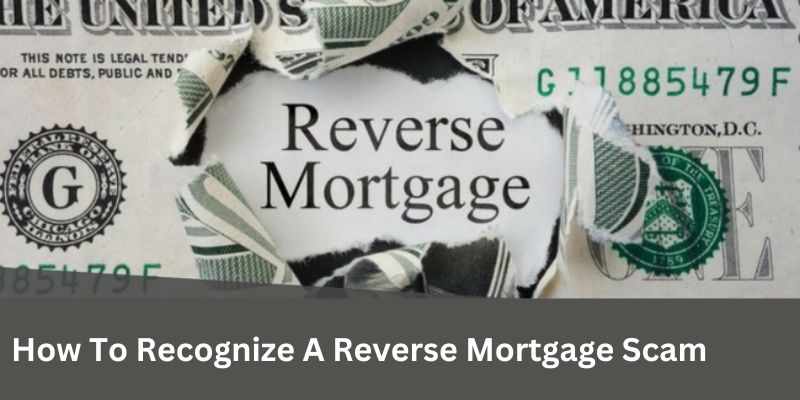How To Recognize A Reverse Mortgage Scam
Triston Martin
Dec 31, 2023
Are you seeking a financial instrument to get additional monthly income or pay off existing debts? Reverse mortgages can sound like the right solution, but awareness of potential scams is important. Scammers may take advantage of vulnerable seniors looking for financial options.
In this blog post, we'll provide helpful advice on recognizing a reverse mortgage scam and ensuring that your decision is the best choice for your circumstances. We'll explain common techniques used by scammers and outline steps you can take to ensure a secure transaction process. Suppose you have doubts about an offer from someone claiming to represent reverse mortgages. In that case, you must know what signs to look out for to protect yourself from becoming another victim of these nefarious activities.
What Is a Reverse Mortgage?
A reverse mortgage is a loan option that enables homeowners 62 years or older to use their home equity as leverage to gain additional monthly income. The homeowner retains property ownership and can only make payments once they sell, pass away, or move out permanently.
Funds from a reverse mortgage can be used for various purposes, such as paying off existing debts, covering medical bills, making home improvements, and supplementing retirement income.
This type of loan has unique characteristics that differ from traditional loans. For example, reverse mortgages do not require credit checks or monthly payments; additionally, they come with no prepayment penalties should the borrower decide to pay off the loan early. The funds are tax-free and can be received in one lump sum or as a line of credit.
Check the Credentials of the Reverse Mortgage Originator
Before entering into a reverse mortgage agreement, taking the necessary steps to ensure you're dealing with a reputable and experienced originator is important. An unchecked originator could lead to serious issues such as foreclosure or aggressive sales tactics.
The best way to guard against these issues is by checking credentials. Ensure the company has an established history and positive reviews from previous customers. Be sure to ask for references and contact information for any customer who can vouch for their services. You should also ensure they are licensed and qualified in your state before proceeding with any transaction.
Another way to check credentials is by verifying the employee's training and certifications. Ask about any continuing education requirements and ask to see proof of certifications or any additional training they may have completed.
It would help if you also inquired about their experience related to reverse mortgages. The more information you can gather on the company, the better prepared you will be when deciding.
Vendor and Contractor Fraud
Vendor and contractor fraud is a growing problem, especially in reverse mortgages. Scammers may attempt to exploit vulnerable homeowners by posing as reliable contractors or vendors offering services related to the reverse mortgage loan process. To protect yourself from this fraud, you should always ensure that any vendor or contractor you hire is licensed and insured.
When researching potential vendors, contact your state's licensing board and confirm that their license is up-to-date and valid. Additionally, ask for proof of insurance such as worker’s compensation or liability insurance; these documents will provide protection should an accident occur while working on your home.
Ask for references from past clients and call them directly to gain insight into the company’s practices.
You should also stay informed about common scams related to reverse mortgages and recognize warning signs that a vendor or contractor is attempting to defraud you. Be wary of offers that appear too good to be true; scammers may pitch services at an incredibly low price, to upsell after they have secured your business.
Make sure to get all terms in writing, including payment expectations and length of service agreement. Read all contracts carefully before signing them, and never sign anything you need help understanding.
Fraud by Relatives and Others
Fraud by relatives and others is another form of scamming that seniors should be aware of when considering a reverse mortgage. Relatives or other parties may attempt to take advantage of the situation and push for an early settlement of the loan, resulting in them receiving a large cut from any remaining equity.
It's important to notify family members, close friends, and trusted advisors if you’re thinking about taking out a reverse mortgage; this will help prevent any potential fraudulent activity from occurring.
It's also important to research individuals associated with the loan process. Check credentials thoroughly; ask for licensure information and references from past clients or employers.
Research their online presence and read customer reviews before signing any contracts. Ensure you understand any terms or conditions related to the loan process and proceed cautiously if you encounter any red flags.
Robbing Peter and (Not) Paying Paul
Taking out a reverse mortgage can benefit seniors, but remaining vigilant and aware of potential scams is important. By verifying the credentials of originators and vendors, researching individuals associated with loan processes, being aware of common fraud techniques, and understanding terms before signing contracts, you can protect yourself from becoming another victim of reverse mortgage scams.
It is crucial to conduct due diligence on any decision related to reverse mortgages; this will help ensure that the solution you choose is best suited for your unique circumstances. Take your time deciding and consult with trusted advisors or family members if necessary. With the right information and steps taken beforehand, a reverse mortgage can effectively supplement retirement income or pay off existing debts.
Flipping Fraud
Flipping fraud is another type of scam that seniors must be aware of when considering a reverse mortgage. Scammers may attempt to convince homeowners that their current equity can be used to purchase a new home at an inflated value.
These individuals will encourage the homeowner to take out a reverse mortgage, to take advantage of them by pocketing the difference in value between the two homes.
The best way to protect yourself from flipping fraud is by researching real estate values and never agreeing to any deals without consulting trusted advisors or attorneys. Be suspicious if someone promises you quick profits from investing in real estate or provides unrealistic estimates on potential returns; these are common signs of a scammer attempting to take advantage of vulnerable homeowners.
FAQs
Q: How do I know if a reverse mortgage suits me?
A: Reverse mortgages are only suitable for some. It's important to research all available options and consult trusted advisors before making any decisions.
It may be beneficial to speak with a financial planner or attorney about your specific situation to determine if taking out a reverse mortgage is the best option for you.
Q: What should I look out for in terms of scams related to reverse mortgages?
A: Common scams include vendor and contractor fraud, fraud by relatives or other parties, and flipping fraud. To protect yourself, always check credentials and references thoroughly, read contracts carefully before signing them, and never agree to any deals without consulting an advisor.
Additionally, it's important to stay informed about common scams related to reverse mortgages and recognize warning signs that a scammer is attempting to take advantage of you.
Q: What can I do to ensure that all transactions are secure?
A: To ensure your transactions are secure, you should always hire a licensed and insured vendor or contractor. Ask for proof of licensure and insurance before proceeding with any transaction. Additionally, research the company's credentials and read customer reviews to gain insight into their practices.
Lastly, get all terms in writing and read contracts carefully before signing them. This will help protect you from any potential scams or fraudulent activity during the transaction process.
Conclusion
Reverse mortgages can be a helpful financial instrument for seniors looking for additional income or help with debt repayment. To ensure safety, it’s important to research available options thoroughly and consult trusted advisors before making any decisions.
Additionally, be aware of potential scams and take steps to protect yourself from becoming a victim. Following this advice makes you more likely to make an informed decision that best suits your circumstances.








